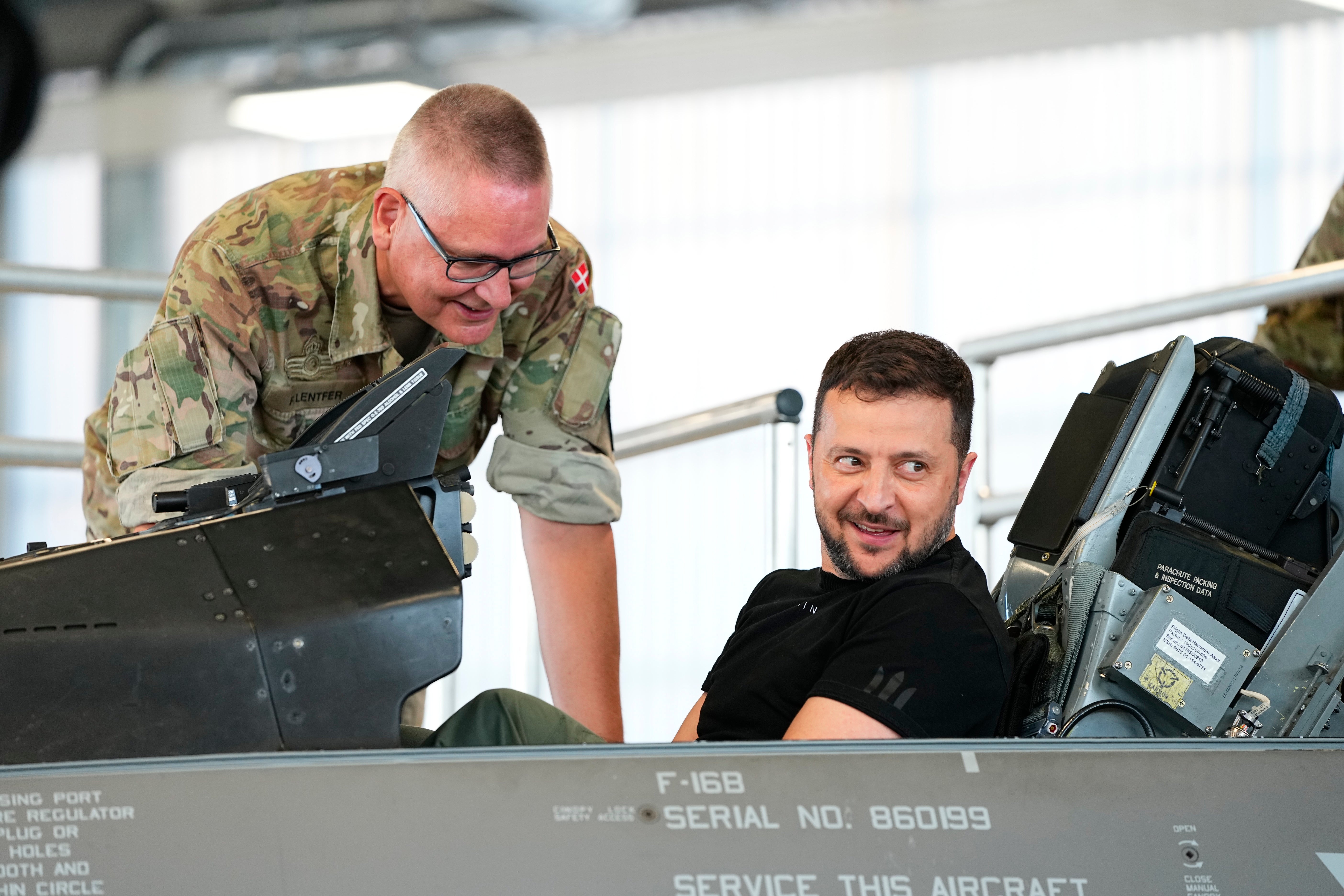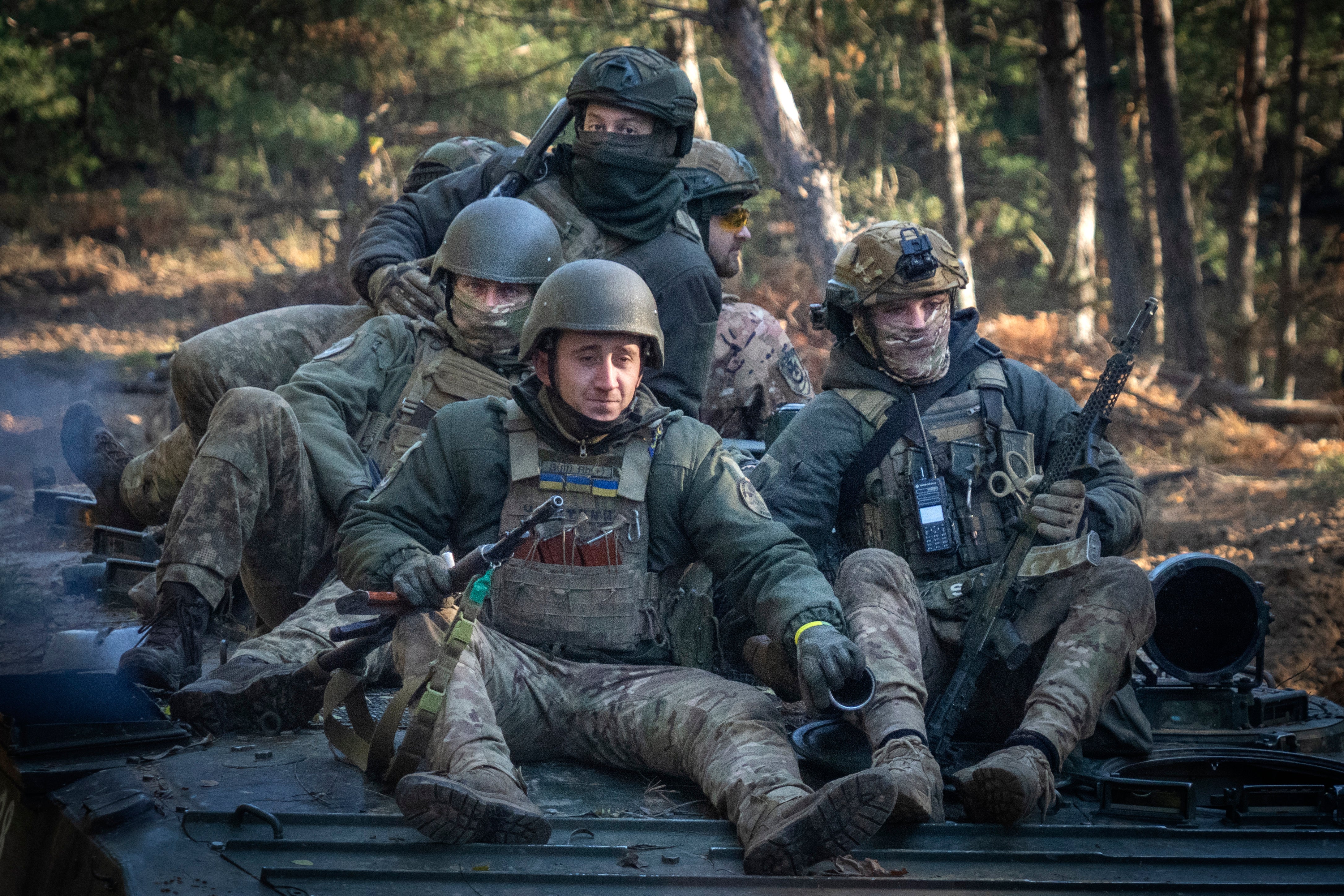‘Time to stand up and be counted’: Denmark’s PM on why it’s vital the West keeps supporting Ukraine
Exclusive: Mette Frederiksen tells Jakob Illeborg that Russia's invasion was the start of a new reality for the world to face, one that underscores the importance of Nato and cooperation between the US and Europe. That includes on fighter jets and pilot training for Ukraine to combat Russia’s forces

Your support helps us to tell the story
From reproductive rights to climate change to Big Tech, The Independent is on the ground when the story is developing. Whether it's investigating the financials of Elon Musk's pro-Trump PAC or producing our latest documentary, 'The A Word', which shines a light on the American women fighting for reproductive rights, we know how important it is to parse out the facts from the messaging.
At such a critical moment in US history, we need reporters on the ground. Your donation allows us to keep sending journalists to speak to both sides of the story.
The Independent is trusted by Americans across the entire political spectrum. And unlike many other quality news outlets, we choose not to lock Americans out of our reporting and analysis with paywalls. We believe quality journalism should be available to everyone, paid for by those who can afford it.
Your support makes all the difference.I don’t see us returning to the world we knew before the war in Ukraine ends, if at all. This is not a parenthesis in history; it is very much the new reality we all live in now," says Danish prime minister Mette Frederiksen.
We are on board her Challenger plane, returning to Copenhagen from a recent summit in Sweden.
The situation in Israel and Gaza and the threat a regional war would pose to European security was the centre of discussion – but the primary purpose of the summit was how to deal with the fragility of European infrastructure and Russia‘s continuing aggression towards its European neighbours.
In 2024, the UK will deploy 20,000 troops, 25 fighter jets, and eight naval ships to the region to help patrol and protect the Baltic Sea and the North Sea with its myriad fragile and de facto unprotected gas and information pipelines that Russia may have already targeted.
A leak on a gas line between Finland and Estonia was detected the day before the summit. A key question is whether the damage was accidental or deliberate. In September 2022, there were explosions on the Nord Stream pipelines close to Bornholm in Denmark, another incident still under investigation. Moscow has denied involvement in either incident, but mix in other events in recent months – such as Denmark having to scramble jets to escort Russian aircraft near Danish airspace – and there is a general sense of unease.
“We still don’t have definitive conclusions, but we know Russia is responsible for many cyberattacks, fake news, and propaganda campaigns,” says Frederiksen, who in 2019 became the youngest Danish head of government ever. She will turn 46 later this month.
"Everything we have taken for granted is under direct attack, has become more fragile, or is up for discussion," she adds, pointing to how the combination of war in Europe, inflation caused by the war in Ukraine, and the climate crisis is a potentially poisonous cocktail.

“It is a new reality, a time where several crises overlap. This will hit some areas worse than others, and it will generate new geopolitical tensions and changes,” she says.
Nowhere are these changes more notable than in Scandinavia. Russia’s invasion of Ukraine led to a seismic shift in security policies. Sweden and Finland abandoned their longstanding neutrality that had survived the Cold War and applied for full membership of Nato. Meanwhile, Denmark has become one of the strongest proponents of military and humanitarian support to Ukraine in the fight against Russia.
“I am proud of our position in the front group of supporters of Ukraine,” says Frederiksen. “With our initiative to donate 19 F-16 fighter planes, we are moving further ahead, becoming the first country to be specific about the size and timing of our donation of fighter jets, and I am proud that even though we are maybe the most active opposers of Russia’s war, the support among the Danish population is still intact.”
The cataclysmic recent events in the Middle East are yet another challenge for the young PM, who has already seen more than her fair share. Since she took office, she has been responsible for Denmark’s response to the Covid-19 pandemic, a war in Europe, and now the events in Israel and Gaza. Although often heavily criticised at home, Frederiksen is a rising international star, and she was favourite to be the next Nato secretary-general before it was decided that Jens Stoltenberg would remain in the post until the end of 2024.
“We now have this ghastly attack on Israel, and all the misery that comes with it,” she says. “This of course has the potential to destablise the region, but it could also destabilise Europe.”

Frederiksen looks out of the plane's window, sips her coffee, and continues.
“We used to believe that security policy was important but confined to states or regions. In this new reality, it crosses borders and continents, everything is interconnected. Wars and crises lead to mass migration that can destabilise Europe, but so does climate change.” While Denmark has taken in tens of thousands of people from Ukraine, Frederiksen has taken a hard line on immigration and her nation has pushed the EU to get tougher.
She wears a serious expression, even on a Friday afternoon. She is not known to be quick with a joke, but has a reputation as a grafter who worked her way to the top job from a relatively humble beginning. Her father was a typographer in the port city of Aalborg in northern Jutland. He was active in regional politics and a lifelong supporter of the Social Democratic Party, which was instrumental in creating Danish society as it is today.
The young Frederiksen, like her father, engaged in party politics in the social democratic youth movement and as an activist fighting apartheid in South Africa. Her career quickly took off, and she became an increasingly influential figure supported by the party. She defined herself as politically to the left of Tony Blair’s third way, supported by her predecessor, Helle Thorning-Schmidt. Africa is still close to her heart. She only finished her master’s degree in African studies in 2009; she was a seasoned parliamentarian by then.
She never drinks alcohol on the job and never wears jeans to work. Recently, she has had run-ins with the Danish press and political commentators over her staunch defence of Israel in the aftermath of the Hamas attack. She has said Israel has a right to defend itself, but that it must abide by international law. It is a position in line with the US and the UK.
The Social Democratic leaders that have been her role models had reservations about what they saw as unnecessary American aggression on the world scene. Frederiksen’s outlook is notably different.

“Transatlantic unity is the most important of all,” she says. “It is where everything begins and ends. Without it, there would be no free Europe today. This is also why it is so crucial for Europe to understand that we need to contribute more. But not in competition with Nato.”
At the start of the summer, Frederiksen’s coalition government approved a new open-ended defence plan valued at 143 billion Danish crowns (£17bn) to reach the 2 per cent of GDP contribution to Nato that Washington has requested from its European defence partners.
This is a very different take on security from the opt-out defence clause practised by Denmark in the EU for many years. A referendum was held last year, in the wake of Russia’s invasion of Ukraine, on abolishing the clause. Two-thirds of the vote agreed to removing the clause. Denmark has gone from belonging to Europe’s peace doves to being security hawks.
As part of the discussion, I recite to Frederiksen a famous Danish poem, “Noget om Helte” (About Heroes), by the much-loved poet and author of children’s books, Halfdan Rasmussen. In the work, from 1957, Rasmussen reflects on state leaders’ obsession with blowing up the world and how he longs for peace in his garden and harmony among people. Frederiksen says she knows it well, as I ask her about the differences between the Denmark of the last few decades and now.
“You ask me where the old Denmark has gone,” she says. “It’s a big question, and you are right that my take on defence is different. There will be no return to an opt-out stance on defence as long as I am in charge.
“It was a different time back then. The vision of a better world reflects the progress made during those decades where more people than ever before were lifted out of poverty. Where, especially after the fall of the Berlin Wall, there was a genuine belief in peace and prosperity. The question, when the history books of our time are written, is whether then was the exception to the rule or if it is the time we live in now. I am afraid, I believe that this world of insecurity is the norm.”

We return to migration. Denmark has gone from having one of the most liberal and welcoming asylum policies in Europe to having one of the most restrictive. The idea of sending asylum seekers to Rwanda – now a policy for the Conservatives in the UK – is a Danish brainchild born by Frederiksen’s Social Democrats.
But she is proud of the number of Ukrainians her nation has taken in. “These will be the defining images of our time. The photos of overcrowded railway stations in Europe, with children putting their little hands on the train window as families were separated, looked like something from the Forties.
“I believe that Europe handled this exceptional crisis of millions of refugees on the move very well. I tip my hat to countries like Poland, which received about 5 million refugees. In Denmark , we opened our doors too. Some of those that came will go home when the war ends, but some will stay, and I am fine with that.”
And back to the importance of the US. Frederiksen has, during her premiership, made sure Denmark has grown closer to Washington, particularly on security.
“If you ask me, I don’t even want a paper’s thickness between us and the US regarding security. This is true no matter who is president of the US,” she says.
Even if this president is Donald Trump? The ex-president faces a number of legal battles, but he is the frontrunner for the Republican nomination.
“This is true no matter who is president of the US,” Frederiksen says.
What if there is a president, like Trump, who doesn’t believe in the importance of institutions like Nato, which Frederiksen describes as the most important institution Denmark belongs to. Doesn’t that leave a very uncomfortable situation?
“I don’t spend a lot of time thinking about this. If it happens, then we will find a way to make it work. We will have to," she says. Her call is for even more European action on Ukraine and unity with the US.
“There are certain times and events that define, not only who we want to be, but who we are,” she adds. “This is the time to stand up and be counted. In my view, Russia’s war in Ukraine is not only about Ukraine as such, but also about Russia's ambitions to dominate and expand. If I am right about this, then supporting Ukraine is also about self-interest.”
Join our commenting forum
Join thought-provoking conversations, follow other Independent readers and see their replies
Comments